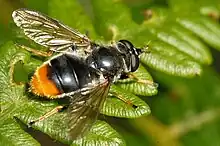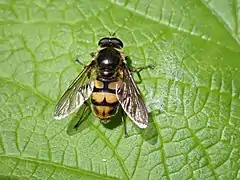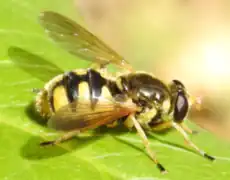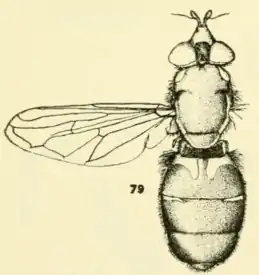Blera (fly)
Blera is primarily a North American genus, though there are 3 species from Europe.[5] The genus is characterized by the following characters:
- face with distinct central knob, less developed in females; frons distinctly produced
- antennae shorter than head width, arista dorsal
- body covered long sometimes dense hairs
- legs simple bare and undeveloped metasternite
- short apical section of vein R 4+5 [6]
| Blera | |
|---|---|
 | |
| Blera fallax female | |
| Scientific classification | |
| Domain: | Eukaryota |
| Kingdom: | Animalia |
| Phylum: | Arthropoda |
| Class: | Insecta |
| Order: | Diptera |
| Family: | Syrphidae |
| Subfamily: | Eristalinae |
| Tribe: | Milesiini |
| Genus: | Blera Billberg, 1820[1] |
| Type species | |
| Musca fallax | |
| Synonyms | |
The larvae are found in decaying heartwood in roots of trees and stumps.
There are keys to American[6] and British species.[7] external map
Species
- Blera ambigua (Shiraki, 1968)[8]
- Blera analis (Macquart, 1842)[9]
- Blera armillata (Osten Sacken, 1875)[10]
- Blera badia (Walker, 1849)[11]
- Blera chillcotti Thompson, 2012[12]
- Blera confusa Johnson, 1913[13]
- Blera eoa (Stackelberg, 1928)[14][5][15]
- Blera equimacula Huo, Ren & Zheng, 2007[16]
- Blera fallax (Linnaeus, 1758)[7][5]
- Blera ferdinandi (Hervé-Bazin, 1914)[17]
- Blera flukei (Curran, 1953)[6]
- Blera garretti (Curran, 1924)[18]
- Blera himalaya Thompson, 2000[19]
- Blera humeralis (Williston, 1882)[20]
- Blera japonica (Shiraki, 1930)[21]
- Blera johnsoni (Coquillett, 1894)[22]
- Blera kyotoensis (Shiraki, 1952)[23]
- Blera lonigseta Barkalov & Cheng, 2011[24]
- Blera metcalfi (Curran, 1925)[25]
- Blera nigra (Williston, 1887)[2]
- Blera nigrescens Shiraki, 1968[8]
- Blera nigripes (Curran, 1925)[25]
- Blera nitens (Stackelberg, 1923)[26]
- Blera notata (Wiedemann, 1830)[27]
- Blera ochrozona (Stackelberg, 1928)[14]
- Blera pictipes (Bigot, 1884)[28]
- Blera robusta (Curran, 1922)[29]
- Blera scitula (Williston, 1887)[2]
- Blera shirakii Barkalov & Mutin, 1991[30]
- Blera umbratilis (Williston, 1887)[2]
- Blera violovitshi Mutin, 1991[30]
- Blera yudini Barkalov, 1991[30]
 Western Wood Fly
Western Wood Fly
Blera scitula Yellow-legged Wood Fly
Yellow-legged Wood Fly
Blera humeralis The Painted Wood Fly
The Painted Wood Fly
Blera pictipes.jpg.webp) Painted Wood Fly
Painted Wood Fly
Blera pictipes
References
- Billberg, G.J. (1820). Enumeratio insectorum in Museo. Stockholm: Gust. Joh. Billberg. p. 138. Retrieved 5 July 2021.
- Williston, S. W. (1887). "Synopsis of the North American Syrphidae". Bulletin of the United States National Museum. 31: xxx + 335. Retrieved 1 July 2015.
- Verrall, G.H. (1901). Platypezidae, Pipunculidae and Syrphidae of Great Britain. Vol. 8,In his British flies. London: Gurney & Jackson. pp. [i] + 691.
- Meigen, J.W. (1800). Nouvelle classification des mouches a deux ailes (Diptera L.) d'apres un plan tout nouveau. Paris: Perronneau. pp. 1–40.
- Veen, M.P. van (2004). Hoverflies of Northwest Europe, Identification Keys to the Syrphidae (hardback). Utrecht: KNNV Publishing. p. 254. ISBN 90-5011-199-8.
- Curran, Charles Howard (1953). "Notes and descriptions of some Mydaidae and Syrphidae" (PDF). American Museum Novitates. 1645: 1–15.
- Stubbs, Alan E.; Falk, Steven J. (1983). British Hoverflies: An Illustrated Identification Guide (2nd ed.). London: British Entomological and Natural History Society. pp. 253, xvpp. ISBN 1-899935-03-7.
- Shiraki, T. (1968). Syrphidae (Insecta: Diptera). Fauna Japonica. Japan: Biogeographical Society of Japan. pp. Vol. II, 243 pp., XL pls., Vol. III, 272 pp., XLVII pls.
- Macquart, Pierre-Justin-Marie (1842). Diptères exotiques nouveaux ou peu connus. Tome deuxieme.--2e partie. Paris: Roret. pp. 5–140. Retrieved 6 July 2021.
- Osten Sacken, Karl Robert (1875). "A list of the North American Syrphidae". Bulletin of the Buffalo Society of Natural Sciences. 3: 38–71. Retrieved 22 July 2021.
- Walker, F. (1849). List of the specimens of dipterous insects in the collection of the British Museum. Part III. London: British Museum (Natural History). pp. 485–687.
- Thompson, F.C. (2012). "Fabulous flower flies for famous fly fanatics (Diptera: Syrphidae). A tribute to the dipterists of the Canadian National Collection". The Canadian Entomologist. 144 (1): 1–16.
- Johnson, C.W. (1913). "On the Criorhina intersistens Walker and an allied species (Dipt.)". Entomological News. 24: 293–295. Retrieved 22 July 2021.
- Stackelberg, A.A. (1928). "Species palaearcticae generis Cynorrhina (Dipt., Syrphidae)" (PDF). Konowia. 7 (3): 252–258. Retrieved 22 July 2021.
- Pettersson, Roger B.; Bartsch, Hans D. (2001). "Blera eoa (Stackelberg, 1928), en ny stubb-blomfluga för Europa (Diptera, Syrphidae)" (PDF Adobe Acrobat). Natur i Norr, Umeå (in Swedish). Institutionen för ekologi, miljö och geovetenskap. 20: 91–96.
- Huo, K.K.; Ren, G.; Zheng, Z. (2007). Fauna of Syrphidae from Mt. Qinling-Bash in China (Insecta: Diptera) (in Chinese). Beijing: Beijing Huonzheng Printer LTD Co. pp. 512 pp.
- Hervé-Bazin, J. (1914). "Syrphides recueillis au Japon par M. Edme Gallois". Annales de la Société Entomologique de France. 83: 398–416. Retrieved 22 July 2021.
- Curran, Charles Howard (1924). "New Canadian Diptera, with a synopsis of the genus Cynorhina". The Canadian Entomologist. 56: 193–196.
- Thompson, F. Christian (2000). "A new Oriental Blera (Diptera: Syrphidae)" (PDF). Entomological News. 111 (3): 181–184. Retrieved 25 July 2021.
- Williston, Samuel Wendell (1882). "Contribution to a monograph of the North American Syrphidae". Proc. Amer. Philos. Soc. 20 (112): 299–332. Retrieved 23 July 2021.
- Shiraki, T. (1930). "Die Syrphiden des japanischen Kaiserreichs, mit Berucksichtigung benachbarter Gebiete". Mem. Fac. Agric. Taihoku imp. Univ. 1: xx + 446 pp.
- Coquillett, Daniel William (1894). "Two interesting new Diptera from Washington". Entomological news, and proceedings of the Entomological Section of the Academy of Natural Sciences of Philadelphia. 5: 125–126. Retrieved 23 July 2021.
- Shiraki, T. (1952). "Studies on the Syrphidae. 2. Some new species from Japan with an interesting Trypetidae". Mushi. 23: 1–15.
- Barkalov, A.V.; Cheng, X.Y. (2011). "A review of the Chinese species of the genus Blera (Diptera: Syrphidae) with description of a new species" (PDF). Zoosystematica Rossica. 20: 350–355. Retrieved 24 July 2021.
- Curran, Charles Howard (1925). "Contribution to a monograph of the American Syrphidae north of Mexico". The Kansas University science bulletin. (1924) 15: 7–216, 12 pls. Retrieved 23 July 2021.
 This article incorporates text from this source, which is in the public domain.
This article incorporates text from this source, which is in the public domain. - Stackelberg, Aleksandr Aleksandrovich (1923). "Cynorrhina nitens sp. nov. (Syrphidae: Dipt.)" (PDF). Supplta ent. 9: 22–23. Retrieved 24 July 2021.
- Wiedemann, Christian Rudolph Wilhelm (1830). Aussereuropäische zweiflügelige Insekten. Als Fortsetzung des Meigenschen Werks. Hamm: Zweiter Theil. Schulz. pp. xii + 684 pp., 5 pls.
- Bigot, Jacques-Marie-Frangile (1884). "Diptères nouveaux ou peu connus. 22e partie, XXXII: Syrphidi (2e partie). espèces nouvelles, No 1er". Annales de la Société Entomologique de France. 3 (6): 315–356. Retrieved 24 July 2021.
- Curran, Charles Howard (1922). "New species of Canadian Syrphidae (Diptera). Pt. II". The Canadian Entomologist. 54: 14–19. Retrieved 24 July 2021.
- Barkalov, A.V.; Mutin, V.A. (1991). "Revision of hover-flies of the genus Blera Billberg 1820 (Diptera, Syrphidae). II". Entomologicheskoe Obozrenie (in Russian). 70: 736–749.
This article is issued from Wikipedia. The text is licensed under Creative Commons - Attribution - Sharealike. Additional terms may apply for the media files.